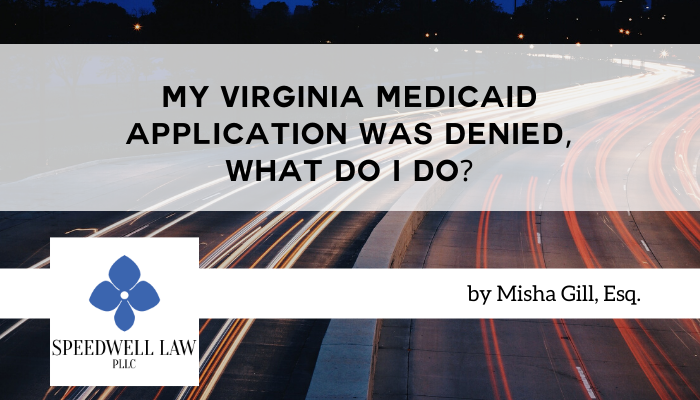
My Virginia Medicaid Application Was Denied, What Do I Do?
If your Medicaid application was denied or you disagree with a coverage or payment decision made by the Medicaid office, and you don’t know what to do, you may be happy to learn that you have options. Anytime you have been informed of an adverse Medicaid decision you can do one of three things:
- Request a reversal;
- Reapply for Medicaid; and/or
- File an appeal
The option you choose will depend on:
- The reason for the denial;
- The type of Medicaid benefits you are receiving;
- The type of health care service, item, or medication in question; as well as
- Whether or not you believe that the adverse decision was made incorrectly.
Requesting a Reversal or Reapplying For Medicaid in Virginia
Requesting a reversal is a largely informal process by which you contact the Medicaid office and request that they reconsider their decision, usually because either you or the Medicaid caseworker made an error in the application paperwork. In many cases, you can simply provide the missing information or documentation or demonstrate where the caseworker made an error and this will result in the decision being reversed.
Alternatively, you may choose to reapply for Medicaid if you applied for Medicaid at a time when you had too much income or assets to qualify and were denied. You may want to reapply after you have spent down your income and assets or implemented certain Medicaid planning strategies in order to get below the Medicaid income threshold.
Appealing a Medicaid Decision
An appeal is a formal process by which you express your disagreement with an adverse action taken against you by the government. When it comes to Medicaid benefits, this pertains to any time you are notified that your benefits have been denied, terminated, not approved, suspended, reduced, or when you file a request and do not receive an answer.
What Can Be Appealed?
Eligibility: You can appeal decisions regarding your eligibility for Medicaid. Eligibility refers to whether you qualify for Medicaid or not.
Services: You can also appeal a decision that refuses a Medicaid service you requested. In other words, you can appeal a denial for a specific service and/or how much of that service will be provided to you by Medicaid.
Every Medicaid case is different, but with adequate proof and the help of the right attorney, you can appeal many different Medicaid decisions. Including, but not limited to:
- Medicaid Eligibility;
- Notice that you are above the income limit;
- Denial of prior authorization for a wheelchair or other equipment;
- A reduction of your personal care hours;
- No response when your doctor asks you to request something that requires prior authorization;
- Denial of a medication you need; and
- Notice that you are no longer considered disabled
How Do I File an Appeal?
You can file an appeal by using a short form from the Medicaid office. Filing this form will get you a hearing before an administrative law judge also known as an ALJ.
There is a bit more to the process, but the bottom line is that the judge is an independent party who will hear the case and decide if the Medicaid office was correct in denying Medicaid benefits.
If the Medicaid office did not give you proper notice or did not process information that you provided, the judge will order your benefits to be provided or continued.
Who Can Appeal a Medicaid Decision in Virginia?
Any Medicaid clients or appellant or their legal guardian can appeal any adverse action or failure to act concerning any Medicaid benefit. It is important to appeal immediately, whether you have received official notice of the denial or not.
In general, the Medicaid office has to give you at least 10 days of advance notice before taking any Medicaid benefits away. If you file an appeal before the date your benefits are scheduled to end, you get to keep your benefits until the appeal is resolved.
Also, be sure to keep any correspondence you receive from the Medicaid office, including the envelope it came in. The postmark on the envelope can be proof that you were not given a 10-day notice.
Furthermore, if you received no notice, keep a record of how you learned about your denial or change in benefits or eligibility. This might include messages from your doctor, pharmacist or others.
Do I Need a Lawyer to Appeal A Medicaid Decision?
The short answer to this question is no. However, appealing a Medicaid decision can get complicated and there are no court-appointed lawyers for these cases.
You have a right to hire an attorney to represent you and, in many cases, you should. However, if your deadline is tight, you should simply file the appeal and then get an attorney involved. This will allow you to preserve your benefits while you seek the right attorney to help you with your case.
If your Medicaid application has been denied, contact us to arrange a free consultation with a qualified and experienced Virginia Medicaid lawyer who can provide you with more information and the assistance that you need.
To learn more about Medicaid and long-term care and how we can help you qualify, please feel free to contact Speedwell Law, PLLC at (703) 553-2577 or [email protected] to arrange a consultation.
Click here to learn more about our Medicaid services and to schedule your free consultation.
The information on this site is for general informational purposes only. The information presented in this site is not legal advice or a legal opinion. You should seek the advice of legal counsel of your choice before acting upon any of the information in this site.





